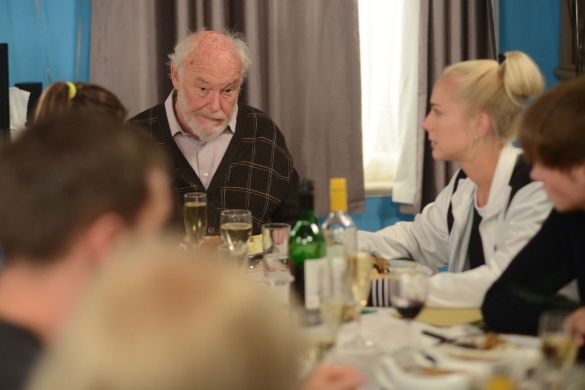“Two roads diverged in a wood, and I—
I took the one less traveled by,
And that has made all the difference.”
Robert Frost, The Road not Taken
These days many of us take choice for granted. In the spare second I get away from the office, I can switch on the TV and choose from hundreds of different channels to flick through. My father at my age probably only had the choice of watching one of three channels, and my grandfather would most likely have spent most of his spare time trying to secure a decent radio signal.
For obvious reasons, I’ve been choosing to watch EastEnders on BBC One this week. We’ve been working with the BBC – strictly under wraps – for several months, providing support and guidance on Stan Carter’s prostate cancer storyline. In case you missed it, you can catch up on iPlayer.
Stan chose not to tell his family that he had prostate cancer for a long time. He didn’t know how they’d handle the news, and he didn’t want to worry them.
“How long have you known, Stan?“
“Long enough.”
“What does that mean? Months?
“Three years if you wanna know.”
Many of you expressed your sympathy for Stan living with his diagnosis on his own for three years. A prostate cancer diagnosis can be earth-shattering and there’s always going to be a lot to come to terms with. Men forced into this position can often feel like they should take on the strong and silent role. Think John Wayne taking a gut full of iron before manfully riding out one last time. I can empathise with that. I prefer to deal with things myself than call in the troops, and I’d rather get lost or take a ‘scenic diversion’ than ask for directions if I can possibly get away with it. I bet there are a few men reading this now who know what I’m talking about. Women too.
The EastEnders cast and crew have done sterling work breaking down barriers around an issue that’s still hampered by a lack of awareness and understanding.
Here’s what you’ve had to say about this over the last few days:
Feel for Stan in eastenders but I would have done the same family doesn’t need heart ache like that
— PASKI GRASSO (@PaskiGrasso) November 17, 2014
Brilliant, raw, heartbreaking performances by Timothy West & Annette Badland! #EastEnders #Stan #Babe
— ENIGMA (@dullagj2) November 17, 2014
No one should have to face prostate cancer, and the difficult decisions it brings, alone. We’re there to support men like Stan every step of the way. You can speak to our Specialists Nurses on 0800 074 8383, or using our live chat service; chat to men who’ve been there, done that and got the t-shirt through our one-to-one support. You can find out all you need to know about prostate cancer, from diagnosis to end of life care using our Information Standard accredited booklets and online resources, and get support on your own patch, through our community support services.
Our community support aims to help improve men and their families’ whole wellbeing, including support for emotional and psychological needs, physical activity, nutrition and complementary therapies. By the end of March this year, we’d teamed up with over 50 community-based organisations to deliver more than 60 projects across the UK – and by the end of August, our community support teams had reached 14,993 people in local areas. For Stan, whose prostate cancer is at an advanced stage, one of the choices he had to make was whether or not to continue treatment and have chemotherapy.
“There must be something they can do. Chemo?”
“I’m not putting my body through that. Not at my age” 
Understandably, Stan’s decision stirred up a lot of emotion:
3 years of Cancer, I don’t want Stan to die #EastEnders — Hollyoaks&Eastenders (@soaps_addict) November 17, 2014
But whether you agree with him or not, Stan has the right to choose how he wants to be treated. If he (and men in his position) decide the disadvantages of treatment on offer outweigh the benefits then who are we to argue? That right to choose how they are treated is something all men should have and it sure as hell shouldn’t be decided for them by where they live.
Last week, the first National Prostate Cancer Audit report showed up some truly disturbing gaps in prostate care in parts of England and Wales. Only 50 per cent of NHS trusts in England and 60 per cent of hospitals in Wales provide all the personal support services a man needs after prostate cancer treatment.
NICE may say that high-dose rate brachytherapy combined with external beam radiotherapy should be an option available for men with intermediate and high-risk localised or locally advanced prostate cancer, but only 11 of the 54 radiation centres in England offer this. And it’s not available at all in Wales.
That sit well with you? It doesn’t with me, and I know it doesn’t with the hundreds of thousands of people in the UK who have signed up to Men United. Each time I sit down in front of one of the leaders of our current healthcare system – usually in a little room in Whitehall – I know I’ve got 10,000 more people standing right behind me than the last time I spoke.
Stan’s choices are limited by the progression of his prostate cancer. Our leaders’ choices are shrinking due to the strength and growing voice of our movement for men. They’re at a fork in the road with two options ahead. Continue down the same care-worn path of putting men’s health on the back seat, or take a step onto the road not taken – a bumpier track, granted – but one that leads to a better future for men. I know which way I’m headed.
Sign up to Men United.

